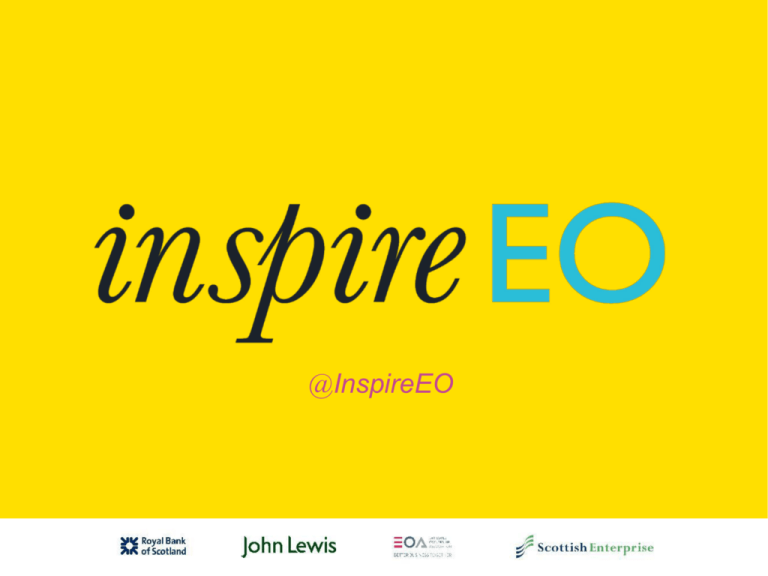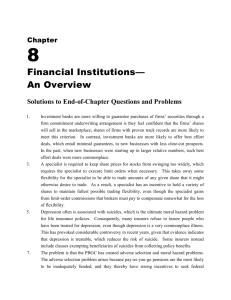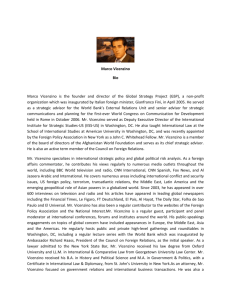An Employee Ownership Association approved
advertisement

@InspireEO @InspireEO Structures, Governance & finance Andrew Harrison Co-ownership Solutions Employee Ownership Structures, governance and funding © Co-ownership Solutions - An Employee Ownership Association approved specialist advisor Definition of employee ownership Company primarily run for the benefit of the employees as owners Not run for a single shareholder or outside shareholders Wholly or majority owned by employees Either direct, indirect or hybrid ownership structure But, employees must have ownership and with it control © Co-ownership Solutions - An Employee Ownership Association approved specialist advisor Two distinct parts to ownership A stake in the business – actual share ownership. An culture of ownership – employee involvement in the business © Co-ownership Solutions - An Employee Ownership Association approved specialist advisor © Co-ownership Solutions - An Employee Ownership Association approved specialist advisor Employee ownership in the UK c£30bn annual UK turnover – 4% of GDP. Government call for ‘John Lewis’ economy backed up with tax reliefs. 28 ‘Nuttall Review’ recommendations. Top 50 EO companies report: 4.6% yoy increase in sales; 25.5% yoy increase in EBITDA; 3.3% yoy increase in employee numbers; 4.5% yoy increase in productivity. EOA aim 10% GDP by 2020. EOA membership doubled since 2014. © Co-ownership Solutions - An Employee Ownership Association approved specialist advisor Wide range of ownership structures, but essentially 3 scenarios: Direct ownership – employees become individual shareholders of the company they work for (normally using tax advantaged schemes such as Share Incentive Plan (SIP). Indirect ownership – shares held collectively on behalf of employees through an Employee Benefit Trust (EBT) or Employee Ownership Trust (EOT). A hybrid of the above – indirect and direct. © Co-ownership Solutions - An Employee Ownership Association approved specialist advisor DIRECT OWNERSHIP Company INDIRECT OWNERSHIP Company Employee trust © Co-ownership Solutions - An Employee Ownership Association approved specialist advisor Trustees in capacity as shareholder hold Board of Directors to account for their management of Anyco Ltd as an employee owned business. Trustees of Anyco Ltd Employee Trust Anyco Ltd Board of Directors are responsible for setting and delivering strategy of the business and ensuring performance targets. Board of Directors of Anyco Ltd Anyco Ltd Employee ownership council Senior management team of Anyco Ltd Employees of Anyco Ltd Senior management team ensure that operational activities are completed and lead teams/departments of employees. Employees elect fellow employees to any of: •Employee ownership council •Board of Directors of Anyco •Trustees of Anyco Employee ownership council acts as a conduit between employees and the Anyco Board of Directors. © Co-ownership Solutions - An Employee Ownership Association approved specialist advisor Employee reward Employee Ownership Trust (EOT) ‘new’ income tax exempt bonus. Up to £3600 annually per eligible employee. Lots of restrictions: Equality requirement 12 months service P&L chargeable. Levels out differences with dividends. Direct ownership Dividends © Co-ownership Solutions - An Employee Ownership Association approved specialist advisor Selling to employee ownership Sale of shares in whole or in part. Immediate or phased Sale to: An Employee Benefit Trust (EBT); a discretionary trust for all employees An Employee Ownership Trust (EOT); a type of discretionary trust introduced by FA2014 A Share Incentive Plan (SIP); specific statutory trust as defined in Sch2 ITEPA2003 Employees directly. © Co-ownership Solutions - An Employee Ownership Association approved specialist advisor Funding the sale to employee ownership The Vendor The Company The Employees The Bank Senior debt Co-op and Community Finance, C4C, eaga Trust Mezzanine debt © Co-ownership Solutions - An Employee Ownership Association approved specialist advisor Tax relief for owner Exemption from capital gains tax: Must sell 50% + 1 share to EOT Proceeds from sale treated as neither ‘gain nor loss’ Limited participation rule 2/5 Connected persons and settlor excluded from benefit Benefits multiple vendors. ER 10% rather than 18% or 28% Individuals, not company Must hold 5% Employee/director Held for at least 12 months © Co-ownership Solutions - An Employee Ownership Association approved specialist advisor Cash £ (deferred?) Shares sold to EOT EOT Company Profit share – subject to profits. (CT relief) © Co-ownership Solutions - An Employee Ownership Association approved specialist advisor Selling to a Share Incentive Plan (SIP) SIP is an ‘all employee’ share scheme. Purpose is to facilitate direct ownership Free Shares (£3600) Partnership Shares (£1800) Matching Shares (up to £1800) No PAYE or NIC at point of award/purchase. Company funding Trustee of SIP generates CT relief: At date of award/purchase of Shares; or Up front if Trustee funded to acquire 10% within 12 months. © Co-ownership Solutions - An Employee Ownership Association approved specialist advisor Developing an ownership culture “Co-ownership is the starting point but its power only clicks in when combined with the full engagement of employees in the ‘co-creation’ of value – the CoCo companies.” CoCo Companies. Work, Happiness and Employee Ownership – Richard Reeves 2007 © Co-ownership Solutions - An Employee Ownership Association approved specialist advisor Successful enterprises are ones in which employees are active ‘co-creators’ of value, rather than passive followers. Clear leadership, decent management and humane policies can help but it is an uphill struggle to get people to go ‘the extra mile’ when the additional money generated flows into other hands. People who are co-owners of an enterprise are inescapably invested in its success of failure! © Co-ownership Solutions - An Employee Ownership Association approved specialist advisor Co-ownership is only half the story It is when a structure of ownership is combined with a culture and systems of co-creation (consultation, information-sharing, employee forums) that organisational performance moves into a new gear. Co-ownership and co-creation weave together to deliver a new way of doing business and a better way of doing work. © Co-ownership Solutions - An Employee Ownership Association approved specialist advisor Gallup research identified 3 clear groups of employees: Engaged Not engaged Actively disengaged. © Co-ownership Solutions - An Employee Ownership Association approved specialist advisor Whether or not an employee was engaged depended upon their relationship with their immediate supervisor/manager © Co-ownership Solutions - An Employee Ownership Association approved specialist advisor Essentials of Great Management 1. Setting clear expectations so partners know what is expected of them. 2. Caring for partners as people. 3. Partners doing what they do best and receiving praise and recognition. 4. Asking partners for their views and letting them know that their opinions count. © Co-ownership Solutions - An Employee Ownership Association approved specialist advisor Our approach - 4 key areas Buy-in by business leaders/managers. Ensuring understanding of EO. Effective employee voice. Embracing employee engagement. © Co-ownership Solutions - An Employee Ownership Association approved specialist advisor @InspireEO Sean Elliot Network ROI Direct Share Ownership at Network ROI About Network ROI • Network ROI provide high-quality managed IT support, IT Project, telephony and connectivity services. • We work with organisations from the public, private and charitable sectors across a range of business sectors. • Most of our clients are headquartered within the Central Belt of Scotland, but we support offices and clients further afield. Why choose Employee Ownership? Personal Goals Business Goals • Financial security • Protect employees’ future • Planned & controlled exit • Reward employees’ contribution • Phased journey to retirement • Organic & sustainable growth • More family & personal time • Protect client relationships • Network ROI legacy • Protect service & culture • Management succession • Incentivise employees Why Direct Share Ownership? • Personal stake makes ownership feel more real – greater sense of ownership • Familiarity with share ownership – many people own shares in companies • Feels like an extension of personal savings plans or investments • Tax efficient way for employees to invest in company & for company to reward employees • Growth in shareholding value directly linked to performance of the business • Flexibility in terms of different ways employees can acquire shares EO Structure • Share Incentive Plan (SIP) combined with Employee Benefit Trust (EBT) Employees get direct stake Trust to hold controlling stake Tax efficient Trust provides market for shares • Initial free share agreement • SIP agreements run annually • Accumulation shares allocated on ‘buy 3, get 1 free’ basis • Open share purchase offered annually to allow employees to maximise HMRC limit How is EO working for Network ROI? • All employees participate in SIP (from min to many at max per mth) • First dividend payments made in 2014 • More empowered and more informed workforce • Employees have greater awareness of business objectives • EO is a key differentiator when it comes to pitching for new business • EO has seen potential leaders emerge from within the business • Employees seeing their individual shareholdings grow in value In Conclusion • Employees and business owner working to the same, clear business & financial objectives – understood by all involved • Direct share ownership focuses attention on personal stake in the business • Helps encourage virtuous circle Retention of key employees Productivity Working ethics & business culture Achieving objectives for the benefit of all If you’d like further discussion, you can e-mail me at sean.elliot@networkroi.co.uk Network ROI Stobo House, Midlothian Innovation Centre, Roslin, EH25 9RE www.networkroi.co.uk @InspireEO Neil Watt Fitwise Neil Watt, Managing Director, Fitwise Management Ltd All your association needs, under one roof What Comes to Mind When I Say Hybrid? What Does Hybrid Ownership Mean? • A mixture of both direct and indirect ownership • Both employees and a trust directly own shares for the benefit of employees Current Hybrid Ownership Position in Fitwise Shareholding Split 2944, 6% 2057, 4% • Total number of ordinary shares 50,000 • John and Maggie have transferred all of their remaining shares to the EBT • 44,999 shares are held in the EBT on behalf of all Fitwise employees • The remaining 5,001 are held in the Share Incentive Plan with 2,944 of these already purchased by employees • Intention is to create an employee owned company. 80% shares held by EBT, 20% shares owned by employees. Max individual shareholding 5% • Loan notes to John and Maggie will be issued by EBT for deferred consideration over 4/5 years 44,999, 90% EBT Staff Puchased SIP Balance What About Governance – Fitwise Trustee and EED Structure Fitwise Trustee and EED Structure Fitwise Employee Benefit Trust (EBT) Fitwise Share Incentive Plan (SIP) Employees Fitwise Management Trustees Ltd USE OF CORPORATE TRUSTEE FMTL FML Employee Benefit Trust FML Share Incentive Plan EBT and SIP are both ‘trusts’ and require ‘trustees’. Corporate Trustee is created to act as sole Trustee of both the EBT and SIP and manage their affairs. Fitwise Management Trustees Ltd: Controlled by a board of directors who act as Trustees. This board normally comprises 1 x employee elected trustee director, 1 x trustee director appointed by the Board of FML and 1 independent trustee director selected by other 2 trustee directors. Incorporated as Share Based Company with ‘special share’ held by employee representative to ensure FMTL is never controlled by board of FML Ltd. Benefits of Hybrid Ownership • Best of both worlds – benefits of both direct and indirect models • Majority of shares can be held in the employee benefit trust to secure long term employee ownership • Protects company from sale or takeover. Any future sale requires a ballot of employees • As the majority shareholder the EBT can determine the outcome of all major decisions • Fitwise senior management is held more accountable to FMTL and employee shareholders • Employees are represented on Boards of both FML and FMTL • Employees feel engaged and have a real stake in the business • Employees have legal right to attend and vote at AGM’s, benefit from share dividends and share in the future success of the business • Encourages we’re all in it together mentality Are There Any Drawbacks? • The fact that the EBT, as majority shareholder can outvote employees in every situation can be seen as undemocratic All your association needs, under one roof @InspireEO Q&A Thank You @InspireEO







